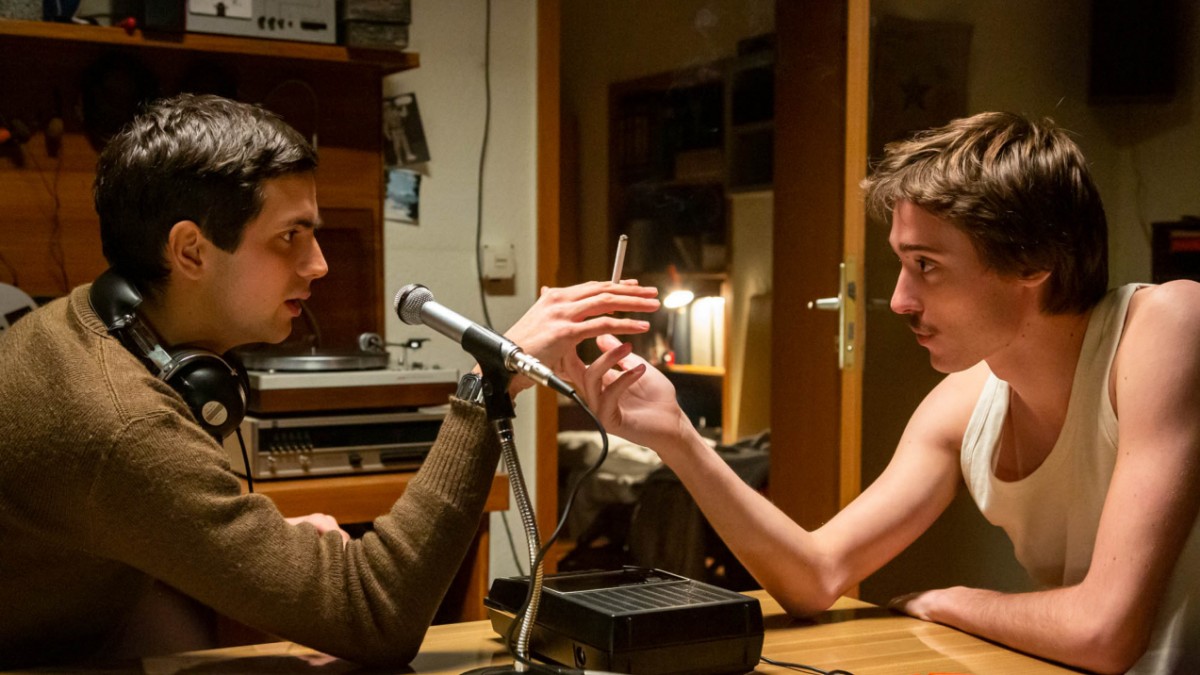“I think I’m in love,” says Philippe, a little miserably, to the medical examiner who has just put a stamp on his draft notice. He was just too lovable and good-natured, wanted to comfort the young, crying woman behind the desk in the drafting office. For this he has given up his strict silence, with which he – together with his father’s cardigan – wanted to appear a bit stupid. Too stupid for the military. “Excuse our methods,” says the doctor, “everyone does what they can.” The young lady was the cleaning lady in charge of getting him to talk.
It is 1981 in the film “The Magnetic” by Vincent Maël Cardona, in a small town in Brittany, the socialist Mitterrand has just been elected and the conservative Giscard d’Estaing has been deposed. Philippe, played by Thimotée Robard with shy seriousness, and his hot-tempered older brother Jérome (Joseph Olivennes) run the pirate radio station Radio Warsaw with a few friends in an attic. In the spirit of legendary BBC presenter John Peel, who also started out as a radio pirate, they broadcast mournfully angry songs from Marquis de Sade, Silent Camera, Gang of FourIggy Pop and Joy Divisionthe quiet Philippe at the controls, the extroverted, bubbly Jérome at the microphone.
The boys are reminiscent of the many twentysomethings who dream of a different life in American cinema but can’t get away from the provinces. In this respect, the call-up order is also an opportunity, because unlike the older brother, who drinks too much and works rebelliously at his father, Philippe at least gets out into divided Berlin with its wild music and disco scene. The only downside: Marianne (Marie Colomb), the single mother hairdresser from Paris, stays at home for a year in the provinces. Jérome caught her, Philippe discreetly adores her from afar, samples the words she speaks “P for Peace” (and P4 for unfit for military service) with echo as a continuous loop in a political-activist jingle for Radio Warsaw, a sound collage of noises and texts , news reports and marching music.
Philippe is a magician at the controls, in Berlin he wants to record a mixtape for the distant Marianne at night in the French army’s broadcasting room, a replica of her farewell gift mixed with nocturnal voice greetings. It’s a stroke of luck that he meets Eduard, who smuggles him into the British military broadcaster, where he’s not allowed to handle weapons but vinyl.
The whirring of the cassettes, the winding of the tapes – everything is full of sensuality
The whole film is laid out as ambiguously as the title connects the technology of magnetic tapes with human attraction. In his amazing debut, Vincent Maël Cardona unfolds a story of growing up between country and city, between staying and going, between love and calling. At the same time, the film is a wistful farewell to the older brother. The words that Philippe addresses to him from the off are charged with melancholy, one suspects that they will go unheard.
And finally, the film is above all a journey back in time to the early 1980s, to the analogue techniques of music and radio, with tapes, cassettes and vinyl, with all the sensual sounds that come with the mechanical insertion of the cassette, the winding of the tape, the… There is a click of the keys, which meanwhile also inspires the digital natives. It’s crazy that a director and his screenwriters, all of whom were born around the time their film is set, manage to recreate this musical flare-up of the post-punk era so authentically.
<div data-consent-guard-fallback="Youtube" class="consent-guard consent-guard–youtube" data-content="
-“>
The SZ editors have enriched this article with content from YouTube
Load content now
–


